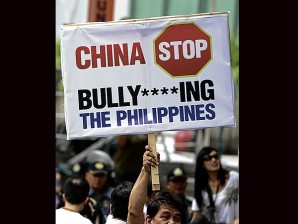Cops stop burning of Chinese flag at global protest rally in Makati

PROTEST GOES GLOBAL. The placard says it all for the protesters during a rally outside the Chinese consular office in Makati City on Friday. Similar rallies were held in the US, Canada, Italy and other Asian capitals. NIÑO JESUS ORBETA
Hundreds of people from civil society and political groups marched to the Chinese consular office in Makati on Friday to protest against China’s intrusions on Philippine territory in the West Philippine Sea.
Three hundred members of the Akbayan party-list marched with protesters from the People Power Volunteers for Reform, Student Council Alliance of the Philippines and Filipino-Chinese Chamber of Commerce in support of the Philippines in the monthlong standoff between Manila and Beijing at Scarborough Shoal.
Authorities tightened security in Manila in expectation of the anti-Chinese protests over the territorial dispute, with both Beijing and Taipei warning their citizens to be on guard for violence.
The Aquino government distanced itself from the protest, saying the march was organized by private groups. But deputy presidential spokesperson Abigail Valte said the protesters were just expressing their freedom of expression guaranteed by the Constitution.
Article continues after this advertisement
No flag burning
Article continues after this advertisement
More than 100 policemen guarded the office tower housing the Chinese consular office on Gil Puyat Avenue, with hundreds more on standby to help with crowd control.
Police stopped an activist, retired police officer Abner Afuang, from burning a Chinese flag at the protest outside China’s consulate.
Afuang poured gasoline on the Chinese flag and was about to light it when policemen stepped in to talk to him.
“I spoke with him and tried to reason with him that the burning he’d be doing may cause harm to the people around him,” Supt. Jaime Santos of the Makati police said. “He got very angry afterward.”
But Afuang backed down. Police found three more Chinese flags in his car and saved them from being burned.
Emman Hizon, a spokesperson for Akbayan, said his group did not approve of Afuang’s action. Flag burning and name calling would only confuse the message that the protesters wanted to send to China, Hizon said.
‘Philippine territory’
“Without a shred of doubt, Panatag is Philippine territory,” he said, using the Philippines’ name for the disputed group of rocks and coral formations 220 kilometers west of Zambales province.
Hizon said protests would continue until China stopped bullying the Philippines. He said there would be marches in coming days leading to Independence Day next month.
Friday’s protest was peaceful. “We want the action to be more festive, celebratory and peaceful,” Hizon said. “And we insist that we have no quarrel with the Chinese people. What we are against is their government’s policy.”
The row in the South China Sea, which Manila calls West Philippine Sea, is potentially the biggest flash point for confrontation in Asia, and tensions have risen since the United States launched a policy “pivot” last year to reinforce its influence in the region.
“The United States’ shift in strategic focus to the east and its entry into the South China Sea issue has provided the Philippines with room for strategic maneuver, and to a certain extent increased the Philippines’ chips to play against us, emboldening them to take a risky course,” said the Liberation Army Daily, the chief mouthpiece of China’s military.
Attention diverted
The Philippines is one of Washington’s closest allies in the region. The Spratly islands in the South China Sea, believed to be rich in oil and other resources, are claimed wholly or in part by China, the Philippines, Taiwan, Vietnam, Malaysia and Brunei.
Beijing warned Chinese nationals in Manila to stay indoors, avoid demonstrations and refrain from confrontations with locals. It urged Manila to ensure the safety of its citizens. Taiwan issued a similar warning to its nationals in Manila.
Presidential spokesperson Edwin Lacierda said Chinese nationals in Manila were safe despite the protests. He said the protests were initiatives of private organizations.
In Beijing, authorities stepped up security around the Philippines’ embassy, with squads of police waiting in streets near the mission and plainclothes guards also monitoring passers-by.
For China’s ruling Communist Party, which is heading toward an end-of-year leadership succession, the dispute with the Philippines can divert attention from recent energy-sapping scandals over sacked Chongqing party chief Bo Xilai and blind dissident Chen Guangcheng.
No one showed up in Sydney
Many Chinese, including military officers, have said popular anger could grow if Beijing remains too soft in responding to rival claims in the South China Sea. A hard approach to the dispute could underline a message of patriotic unity while serving as an antidote to domestic problems.
The Shanghai government-run website, eastday.com, published a photograph on Thursday that it said showed a reporter from a local TV station planting the Chinese flag on the main reef of the Huangyan Island, the Chinese name of Scarborough Shoal, where Philippine and Chinese civilian ships are engaged in a more than monthlong staring match.
Besides Manila, organizers planned protests at China’s embassies and consulates in the United States, Canada, Australia, Italy and other Asian capitals. But no one showed up to a scheduled protest in Sydney. With reports from Norman Bordadora, AP